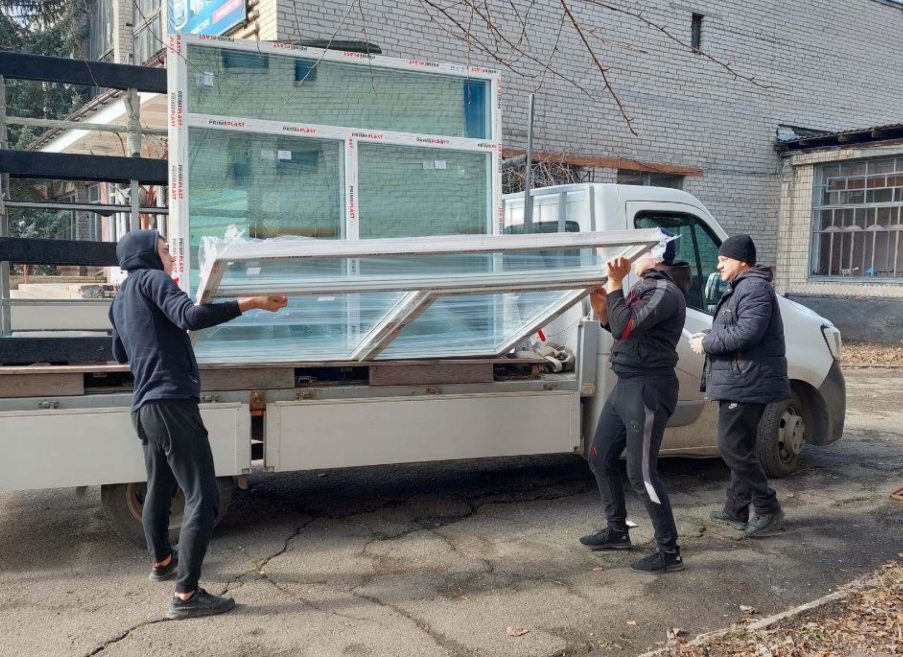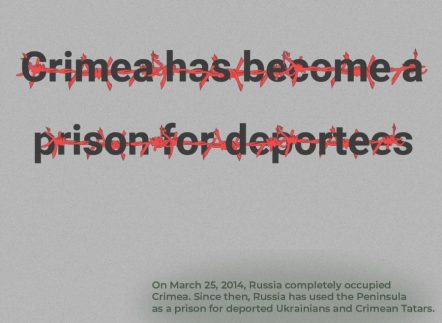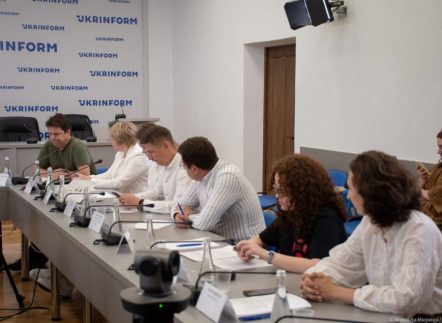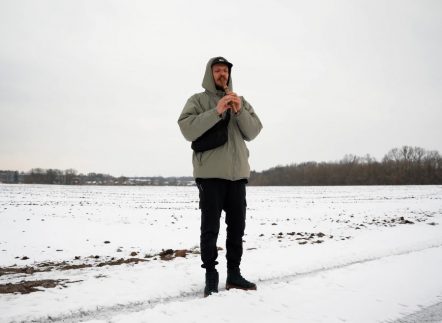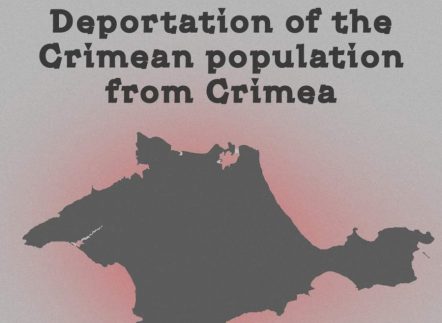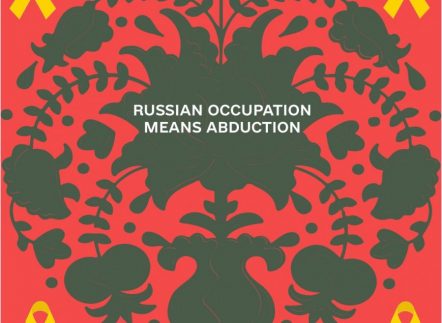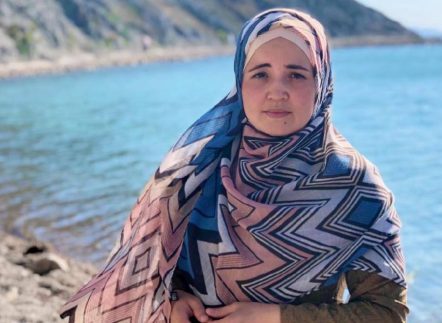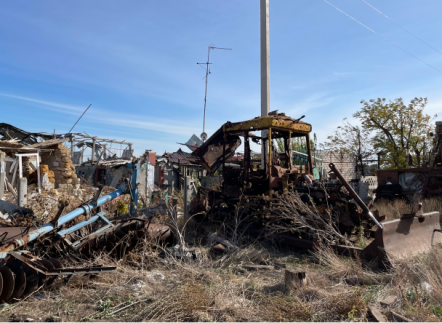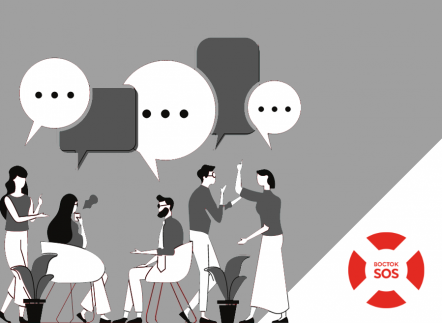Since May 20, Mariupol has been completely occupied by the russians. From the first days of the full-scale invasion, there were fierce battles for the city. Trying to capture Mariupol the russians bombarded it with prohibited ammunition, carried out repeated air raids every day and destroyed the city with artillery shells. People who stayed in the city did not have access to water and food, and the russian military often did not allow them to leave. Since 2014, the Charitable Foundation “Vostok SOS” has been collecting information on war crimes committed by the russians on the territory of Ukraine to transfer this data to international courts and encourage the punishment of the guilty.
Yana Shynkarenko, a documenter of the foundation, recorded the story of Svitlana, who was forced to stand in queues for long hours to get food, hide from russian fighter jets, drink rainwater and melting snow, light fires in the house and leave Mariupol in a “wild” evacuation saving her sons. After that, the woman found out that her house had been completely destroyed by the russians.
I am a designer; I did cultural projects in Mariupol. I lived in the Prymorskyi district with two sons. We had a private house opposite the military unit not far from the centre, near the cinema “Komsomolets”. We had a dog and two cats. On February 24, 2022, two adults and three teenagers were in our house – my friend with his son came to visit us.
The day the full-scale invasion began, I came to the office, but we were quickly let go from work. I haven’t been to work since that day. Explosions were heard on the outskirts of the city, from the Left bank district. Military vehicles were driving through the city. Together with other people, I was standing in a queue at the cash machine.
The next day we went to the grocery store. There was enough food in the first week. On March 2, the water, electricity and mobile connection disappeared; on March 4, the gas supply was cut off. We managed to fill a full bath of water and two 19-liter bottles of filtered water, and later replenished our supplies with rainwater and snow. There were three places where we could buy food: the Central Market, the wholesale market and the shop “Dzerkalnyi”. We had to stand in a queue for 4-6 hours. There was a lack of food and hygiene products.
On March 9, people came to the Central Market to buy products and a russian rocket flew there. At the same time, the city hospital №3, the maternity hospital, in particular, was shelled. People died, including a woman with a newborn child. On the same day, the rocket flew to Pryazovskyi State Technical University. At that moment, I realized for the first time that the war was already there, nearby. Until that time, the shelling was far away: in the East and Left bank micro districts, from which people were fleeing. The shopping center “PortCity” burned down from the russian shelling, and the second bus station was heavily shelled.
When it became really scary, we gathered with the family and agreed on a rule: to live together on the first floor in one room, so as to help quickly if someone is injured. Besides, it is warmer: there was no heating, and the windows could not be closed tightly, because they were constantly shaking from the explosions. We were afraid that the blast wave would simply knock them out. The temperature in the house dropped to +8 at first, then to +4, and when we were leaving the house, the water froze in the cup on the table. It was an extremely cold spring, but we had plenty of blankets, and even transferred them with the beds to the hospitals when people collected help.
We didn’t try to find shelter, we stayed at home. When we saw what russian rockets had done to the center of Mariupol, we realized that they could land anywhere. I don’t know if it would have been easier to die at home, because I wasn’t going to die. It was easier for me to survive at home.
At first, we tried to visit our parents but quickly realized that it made no sense – on the way you could have come under fire and died. Or you could come, it will fly to them and they will die. We also walked past the military unit. Once, we went to my parents with my youngest son, when suddenly we heard the roar of an airplane. We leaned against the wall of the five-storey building, ran to the basement, and then heard loud explosions – the russians hit the military unit. We were sitting in the shelter and then frightened ran home.
On March 16, russian aircraft hit the Drama Theatre, where hundreds of residents, mostly women and children, were. Bombs had already hit the Prymorskyi district, they flew into the center, around the stadium “Illichivets”. We looked out the windows and saw smoke on one side, fire on the other, and shells exploding nearby.
There was a pet store near in the basement of a five-storey building. I ran there to get food for the dog but saw that the upper part of the building was simply gone. I thought that at any moment there could have been nothing to feed the dog, or there would be no one. We didn’t plan anything at that time, absolutely nothing. We lived for one day.
Then something flew near our house, the russians were shelling our street. Perhaps it was a mine because there was almost no explosion, but it shattered the windows and cut the gate. We were very lucky: all of us were doing something outside, but right before the attack we went into the house. I went to the bathroom and had just undressed when suddenly I heard an explosion. We were very scared and ran to the basement. Fortunately, everyone survived. I think we were lucky – we didn’t see any dead bodies and always helped each other with our neighbours. Once, as a result of shelling, the house caught fire, and we drove the cars away from the burning building together (there was nothing to put out the fire). After the shelling, they visited and checked whether everyone was alive. My husband brought food, flashlights and other essentials.
On March 17 or 18, two mines destroyed the house of our closest neighbours, they managed to run to the basement. Then we realized that we had to get out.
It’s easy to say… But how to leave? There was no mobile connection, information was given only from neighbours, only rumours. There was information about the evacuation from the stadium “Illichivets”. Many people were hoping to leave the city, but the Ukrainian military (the central part of the city was under the control of the Armed Forces) refused, it was dangerous. There were rumours that the russian army was shooting civilian convoys.
My husband soon moved us to a house near the railroad, almost on the beach. There were no attacks there at that time, so we hoped to stay overnight. Other people lived there before us, they even made a fire. We had been waiting for evacuation for three days. It seemed like weeks had passed.
Then my husband found the car and fuel. I was already looking for seedlings and wanted to grow vegetables in the summer to live until the next winter. But the sons said: “It is necessary to evacuate.”
And we went practically on our own, without a corridor, an evacuation convoy, guarantees, hope or information. The phones had been discharged long ago, and the Ukrainian radio, which we were listening to after March 17, stopped working. Fighting was going on in the city, it was dangerous to go to the Left bank, and we did not even consider the option of evacuating through russia. We went in the direction of Zaporizhzhia.
On March 21, in the morning, seven people (my neighbours, sons and I) got into a car and went to meet acquaintances of our friends. There was a very steep hill on the way out of the city, we stopped and could not start the car, then we pushed it to the russian checkpoint (there were no Ukrainians in the city, Mariupol was surrounded by russians). It was the only roadblock towards Manhush. We were inspected and let through.
We arrived in Manhush in the afternoon. The car didn’t start. We spent the night in a refugee shelter in a kindergarten. God bless the people who let the refugees in there. At six o’clock in the morning, we were already standing on the central street waiting for the buses to Zaporizhzhia. Those who wanted to go to russia stayed near the kindergarten, buses came to pick them up and took them away. People came up, asked who was at the end of the line, and started to worry, and then I began to register those who wanted to get to Zaporizhzhia. As of 11:00 a.m., the line consisted of approximately 100 people.
We were lucky – there was a big bus of the women’s football team from Vinnytsia, which was picking up someone from Mariupol, but there were only a few people in it. He stopped near the crowd, and the captain of the team came out and said that they were taking women and children. The sons ran for their things.
About a dozen private cars with people who were afraid to go alone were parked behind the bus. All the cars had the inscriptions “Children” and “People”. We organized an evacuation column.
In one of the cars, a woman was sitting in the front seat and holding an icon in her hands. Her husband said he would take one woman with a small child. My neighbour’s husband barely persuaded her to get into the car with her five-year-old daughter. The second 17-year-old daughter said she would stay with her father. And I asked if they would take another girl – they agreed. Then they realized that dad was alone, so they took him as well.
We left from Manhush to Zaporizhzhia in different cars, but together. We reached the city the same day, on March 22. We didn’t have to spend the night in the fields or in the villages on the way.
At the same time, russian troops were beating very hard in our area in Mariupol. At the beginning of April, our house was completely burned down. The photos of the ruins, with one chimney sticking out in the middle, were sent to me, in May, I suppose.
I also heard that two of my colleagues died. I still don’t know where they hid from the shelling and how they died.
Fortunately, my loved ones are alive, and most of them have left the city.
